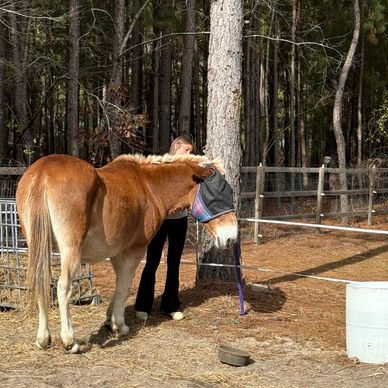Meet Some of Our friends
Johnny the Mule
Johnny the Mule

FUN FACT
ever hear the saying stubborn as a mule? Mules can be very stubborn try moving a mule when it doesn’t want to be moved it’s like trying to move a truck in park. 🤣
Kitty
Johnny the Mule

FUN FACT
A female horse is called a mare.
Tilly
Tilly

FUN FACT
Tilly is a milking cow.
Daisy
Tilly

Daisy is a milking cow
DUCKS

PIGEONS

CHICKEN FAMILY

FUN FACT
Besides Shredder, we have an entire family of chickens.
BARLEY

FUN FACT
Barley is a chipmunk pig and he can be trained!!
OUR FIRST PIGEON
OUR FIRST PIGEON

FUN FACT
Our first pigeon walked with us in the Walmart parking lot and would not fly away. We picked him up and carried him home!!. That was the start of our petting farm!
Bella
OUR FIRST PIGEON

Bella is our first miniature goat.
Dusty
Billy Bob
Dusty is our first miniature horse.
Billy Bob
Billy Bob
Billy Bob is a pygmy goat.
Benefits of Children interacting with Animals
How can animals help with children's reading?
How can animals help with physical health conditions?
How can animals help with children's reading?
Animal companions can make a person smarter.
Some research suggest that an animals presence helps a child focus and becomes a motivation to continue reading because it results in a fun reward. For more than 30 years, animal-assisted reading programs have helped struggling readers improve and feel more confident.
How do animals help children focus?
How can animals help with physical health conditions?
How can animals help with children's reading?
One study found that dogs can help children with ADHD focus their attention. Researchers enrolled two groups of children diagnosed with ADHD into 12-week group therapy sessions. The first group of kids read to a therapy dog once a week for 30 minutes. The second group read to puppets that looked like dogs.
Kids who read to the real animals showed better social skills and more sharing, cooperation, and volunteering. They also had fewer behavioral problems.
Another study found that children with autism spectrum disorder were calmer while playing with guinea pigs in the classroom. When the children spent 10 minutes in a supervised group playtime with guinea pigs, their anxiety levels dropped. The children also had better social interactions and were more engaged with their peers. The researchers suggest that the animals offered unconditional acceptance, making them a calm comfort to the children.
How can animals help with physical health conditions?
How can animals help with physical health conditions?
How can animals help with physical health conditions?
Animals may help you in other unexpected ways. A recent study showed that caring for fish helped teens with diabetes better manage their disease.
Researchers had a group of teens with type 1 diabetes care for a pet fish twice a day by feeding and checking water levels. The caretaking routine also included changing the tank water each week. This was paired with the children reviewing their blood glucose (blood sugar) logs with parents.
Researchers tracked how consistently these teens checked their blood glucose. Compared with teens who weren’t given a fish to care for, fish-keeping teens were more disciplined about checking their own blood glucose levels, which is essential for maintaining their health.
Recent studies suggest that early exposure to pets may help protect young children from developing allergies and asthma.
Help Our Cause
Your support and contributions will enable us to meet our goals and improve conditions. Your generous donation will fund our mission.

Copyright © 2026 Change Has Inspired New Opportunities - All Rights Reserved.